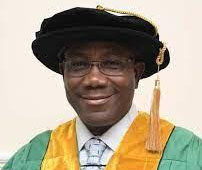
As the human race grapples with the threat of climate change and environmental destruction, the Deputy Vice-Chancellor, Academic, Research, Innovation and Partnerships, Osun State University, Osogbo (UNIOSUN), Prof. Anthony Kola-Olusanya, has called for concerted efforts from all concerned to mitigate the effects.
Kola-Olusanya, a Professor of Environmental Sustainability said the future of sustainable development goals and their implementations must reflect an awareness of environmental boundaries, with a view for tighter controls in terms of legislations, conventions and treaties.
He disclosed this while delivering the 14th inaugural lecture of the university titled: ‘Saving humanity and the planet earth: Humanity must rethink its development trajectory,’ where he looked into human-induced environmental destruction; ecological footprints and humanity; planetary boundaries and sustainable development goals and implications for environmental sustainability, among others.
According to him, climate change negatively impacts developing countries, especially poor people and low-income communities in Africa and other developing countries.
Besides, he noted that with a third of sub-Saharan Africans living in drought-prone areas, agricultural production in the region will experience catastrophic declines due to climate change.
“For Nigeria to protect its environment, it must make conscious efforts to drastically reduce climate change and other forms of environmental degradation to achieve a healthy and safe environment to give these rights an effect,” he said.
To achieve environmental sustainability, youths and children within the formal and informal learning sectors must be taught about the 17 sustainable development goals as the path to achieving a more sustainable future and to be aware of their roles in addressing global challenges
He noted that with the 2030 Agenda, which harps on environmental sustainability, youths and children within the formal and informal learning sectors must be taught about the 17 SDGs as the path to achieving a more sustainable future.
The erudite scholar, as part of his recommendations, said with the climate crisis, the government must make environmental sustainability a more appealing priority for businesses to encourage people to live more sustainably, to positively impact climate over the whole value chain, improve impact on the environment, people, and atmosphere, and productive input on society.
“As such, companies should be held accountable for all aspects of the industry, and any environmental damage or harmful emissions should be limited or removed from productive processes.”
He also emphasized that policies that promote the decarbonisation of the energy industry through clean energy resources and renewable processes, must be in place to provide clean and affordable energy for all.
Pointing out that sustainable development is a societal challenge, Kola-Olusanya said improvements in education and healthcare are required to achieve higher income and better environmental decisions.
He added that urban planning patterns should be transformed for the good of the population and the environment, which may be done through ‘smart’ infrastructure and internet connectivity.
Besides, the university teacher advocated a digital revolution in science, technology, and innovation to support sustainable development, saying the development of information technology would facilitate sustainability.
“It is also expected that resources will be reused to suit the continued national increase in population in what is commonly referred to as a ‘circular economy’. This change would allow one person’s waste to be another’s resource in a process that would greatly reduce waste and create a more efficient supply chain,” he added.






